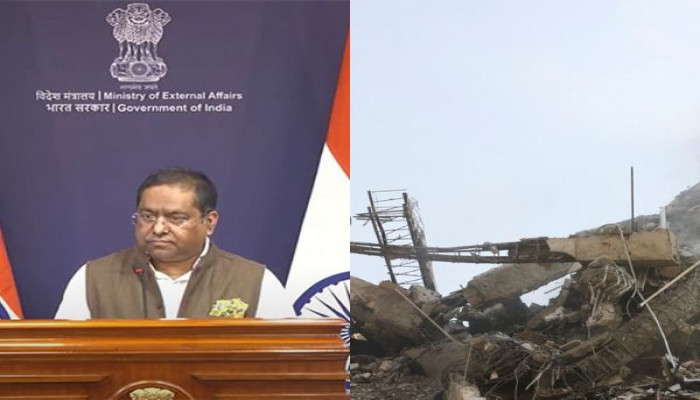Operation Rising Lion: Israel strikes Iran's nuclear facilities; India urges calm, advises citizens to stay safe
- In Reports
- 05:21 PM, Jun 13, 2025
- Myind Staff
Israel hit Iranian nuclear facilities through precise strikes early Friday morning and killed a number of Iran's top security officials. Israeli soldiers and the intelligence community conducted a well-targeted and coordinated operation that broke Tehran's command chain.
President Trump warned that further attacks would be "even more brutal." He increased pressure on Iran to make a new deal to curb its nuclear program.
Israeli forces confirmed their strikes persisted into Friday afternoon. The Prime Minister of Israel, Benjamin Netanyahu, described the attack as a last resort. He said Israel acted to stop a nuclear-armed Iran, which Israel viewed as an existential threat.
The Israeli strikes killed Iranian leaders and nuclear scientists. The strikes also targeted Iran's long-range missile facilities and aerial defences.
President Trump, whose administration had been holding nuclear talks with Iranian officials, spoke on Friday. He said Tehran "must make a deal, before there is nothing left."
Israel battled Iran’s proxy forces across the Middle East for years. More recently, Israel and Iran had exchanged previous volleys of strikes. Friday’s attacks were the first time Israel successfully struck Tehran’s nuclear facilities.
Israel hit Iran's main nuclear enrichment plant at Natanz. A military spokesman said the site had suffered "significant damage."
Iran's supreme leader, Ayatollah Ali Khamenei, said that Israel "should anticipate a harsh punishment."
Later Friday morning, Israeli forces announced Iranian troops had launched approximately 100 drones into Israel. Prime Minister Netanyahu vowed the fighting would last "as many days as it takes."
The Israeli forces worked to intercept the drones. At the time, there were no immediate indications of significant damage from the drone attack.
The Israeli military and Iranian media confirmed that Mohammad Bagheri, the chief of the military and the second-highest commander after the supreme leader, was killed. Other senior security officials were also killed in the attacks.
Ayatollah Khamenei acted quickly to appoint replacements. He did this to avoid the appearance of a leadership vacuum.
Israel struck the Natanz nuclear facility directly. This site was the core of Iran's nuclear program.
The Israeli military stated it caused "significant damage" at Natanz. It hit an underground compound housing centrifuges.
Rafael Grossi, the chief of the International Atomic Energy Agency, said there were no indications of attacks at two other major Iranian nuclear facilities: the underground uranium enrichment site at Fordow and the Isfahan nuclear fuel site.
Israel struck at least six military bases around the capital, Tehran. It also bombed residential homes inside two highly secured military compounds. Israel also attacked multiple residential buildings across Tehran.
Four senior Iranian officials confirmed these details. Residents in Tehran reported hearing large explosions. Iranian state television broadcast images of smoke and fire billowing from buildings.
Long lines formed at gas stations and grocery stores throughout the city. Iran’s government reported civilian casualties. Officials said the attacks killed several people, including children, and wounded dozens more.
Earlier this week, the United States withdrew diplomats from Iraq, which borders Iran to the west. The U.S. also authorised the voluntary departure of family members of American troops from the Middle East. The U.S. military kept a large fleet of warplanes, naval vessels, and thousands of troops stationed in the region.
India issued a statement on June 13 as tensions escalated between Iran and Israel, two longstanding adversaries. It advised Indian citizens to stay cautious and follow local security advisories after Israel launched destructive airstrikes in Iran.
In a statement issued on June 13, the Ministry of External Affairs said, “We are deeply concerned at the recent developments between Iran and Israel. We are closely monitoring the evolving situation, including reports related to attacks on nuclear sites.”
India called for dialogue and diplomacy to resolve the conflict. It said, “India urges both sides to avoid any escalatory steps. Existing channels of dialogue and diplomacy should be utilised to work towards a de-escalation of the situation and resolving underlying issues. India enjoys close and friendly relations with both the countries and stands ready to extend all possible support.”
India also advised its citizens to stay alert and follow security instructions. It said, “Our Missions in both countries are in contact with the Indian community. All Indian nationals in the region are advised to exercise caution, stay safe and follow local security advisories.”







Comments